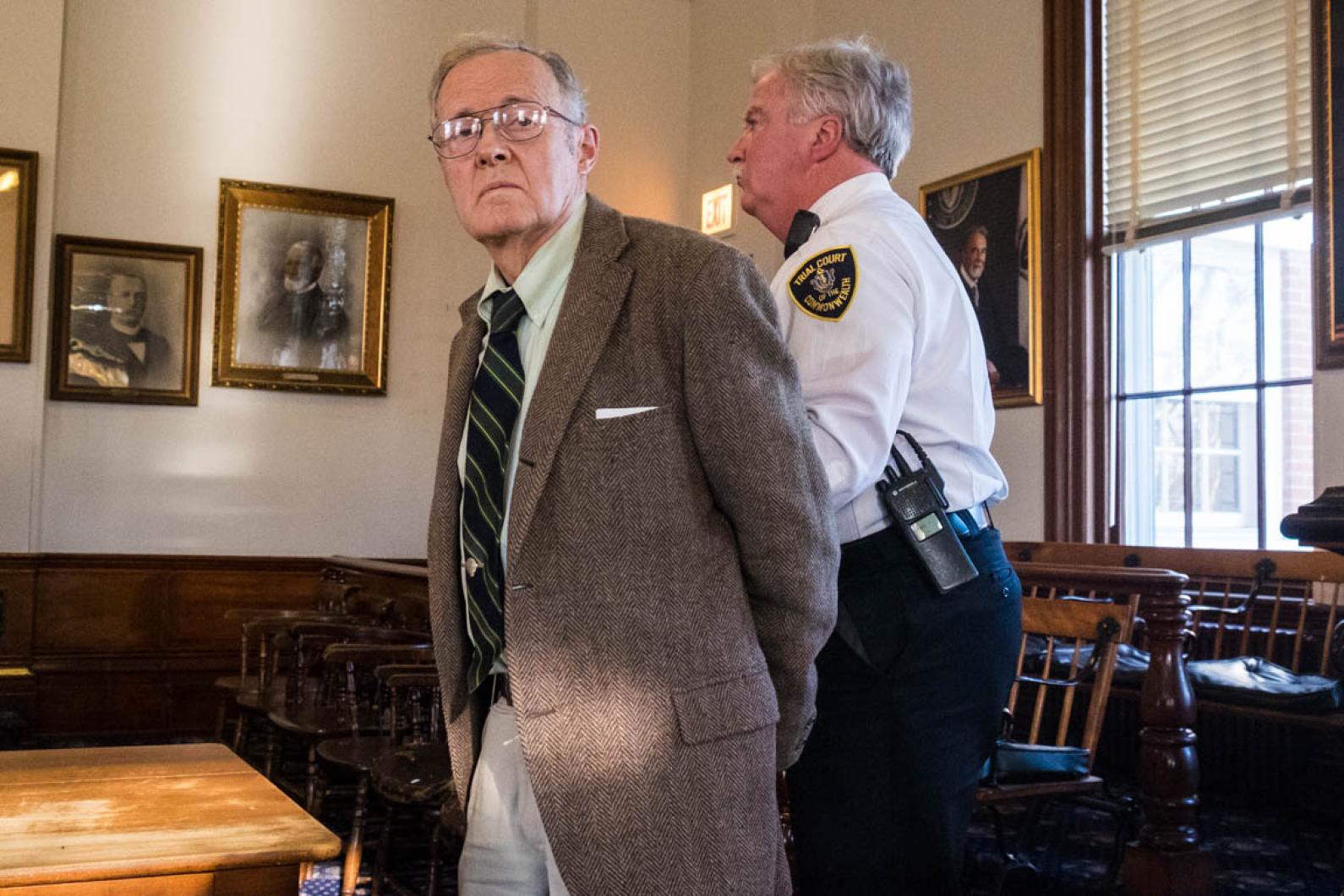Benjamin (Buzzy) Hall Sr. was led out of the Edgartown courthouse in handcuffs and leg restraints Friday after a superior court judge found him in contempt of court and ordered him to jail for 90 days. A few hours later Mr. Hall was released from jail after a check was delivered to settle the dispute.
Dukes County Sheriff Michael McCormack confirmed on Saturday morning that Mr. Hall had been released at about 5:15 p.m. Friday, and that money had been paid. Daniel Larkosh, attorney for the camp meeting association which is owed money in the case, said he had not seen the check but was told it had been delivered.

“I don’t like to do what I’m about to do. I really do not,” the judge said. “Lucky 7 was ordered to pay. You openly defied that order. Plain and simple. You just decided you weren’t going to pay it.” He continued:
“Why he intends to test the resolve of this court, I don’t know. He may purge himself of contempt by paying the money.”
A court officer stepped forward immediately and placed Mr. Hall in custody by handcuffing his wrists behind his back.
Earlier in the brief hearing, as Ben Hall Jr. argued that Lucky 7 had no assets and no ability to pay, Judge Moriarty, interrupted him.
“Stop,” the judge said. “The reason Lucky 7 doesn’t have any funds is because you set the trust up that way so it wouldn’t have any funds. This argument that Lucky 7 doesn’t have any funds is due to the fact that you made a blatant attempt to defraud its creditors. So stop it.”
The dramatic courtroom scene was the culmination of years of legal skirmishing stemming from a dispute between two Oak Bluffs business owners.
It began in 2002 when the senior Mr. Hall, acting through the family trust Seagate, sued a Chinese restaurant in Oak Bluffs which he claimed had installed an exhaust fan that caused kitchen fumes to blow into the Hall family-owned Island Theater during movie showings. Mr. Hall also sued the Martha’s Vineyard Camp Meeting Association, which leased the land where the restaurant was located to restaurant operator Pauline Gregory.
Mr. Hall and Ms. Gregory agreed to settle part of the lawsuit out of court in 2011; as part of the settlement Ms. Gregory agreed to pay the Hall family $17,400.
The portion of the complaint involving the camp meeting association hinged in part on disputed ownership of a one-foot strip of land between the theatre and restaurant building. The superior court decided the case in favor of the camp meeting association in 2010. The senior Mr. Hall, represented by his son, appealed. The appeal took most of three years, and in the end the appellate court ruled against Mr. Hall, upholding the lower court.
The appellate court ordered the senior Mr. Hall to pay the camp meeting association $38,385, to reimburse it for money spent on attorney fees and court costs, under a superior court rule concerning frivolous appeals.
When Mr. Hall refused to pay the judgment, Mr. Larkosh, the attorney who has represented the camp meeting association since the beginning of the case, filed a complaint of contempt in Dukes County superior court. Adjudicating that complaint took more than 18 months. Most recently, following several hearings, motions and witness testimony, Judge Moriarty issued a stern decision ordering the senior Mr. Hall to pay the judgment from the appeal, along with an additional $42,007 for attorney fees and court costs the camp meeting association incurred during the contempt hearing. The two judgments total $80,392.
The judge had ordered Mr. Hall to deliver a certified check to the association by 2 p.m. on Friday or appear in court to explain why.
The judge had warned that “this court is prepared to utilize all measures at its disposal to ensure compliance with the orders of the court.”
He also had sharp words for a series of legal maneuvers involving the Hall family trusts, noting that nine minutes after the start of the contempt trial, the Hall family initiated a series of trust-to-trust transfers and loans. The Hall family has extensive commercial real estate holdings which span the three down-Island towns.
“Hall maintains that his failure to pay the order of the appeals court is due to the fact that Lucky 7 has no funds from which to pay,” Judge Moriarty said, referring the family trust that was part of the lawsuit. “This court is not so persuaded. Since the date of the order of the appeals court, Lucky 7 has had ample income and assets with which to pay, but simply has refused to do so. The real reason for his non-payment, as demonstrated by his sworn testimony, rests with his personal antipathy toward the [camp meeting association] counsel. As a result, he has engaged in a shell game in order to put Lucky 7’s assets beyond the reach of his creditors.”
Mr. Larkosh said Saturday he was satisfied with the outcome.
“Personally, I'm happy Mr. Hall is not in jail. It was certainly never my intention to have him in jail. My clients just wanted to be paid for spending money on this frivolous lawsuit,” he said.








Comments (52)
Pages
Comments
Comment policy »